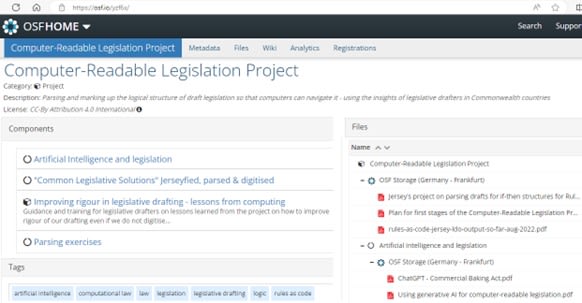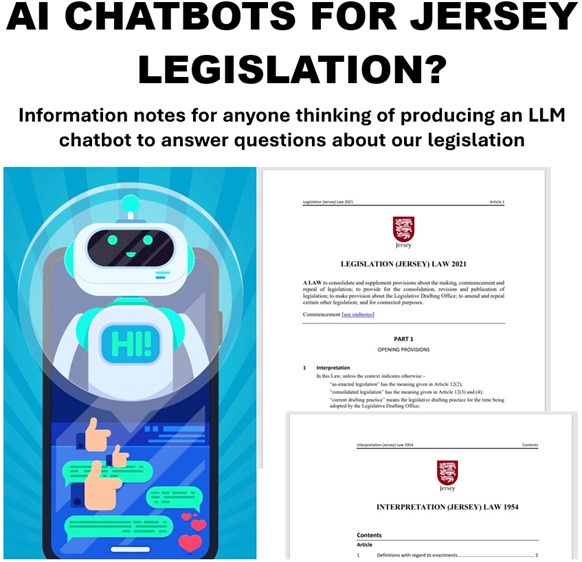More news from Jersey’s Computer-Readable Legislation Project
Artificial Intelligence and other developments
New ways to see what we are up to
We have just set up a website for the project at https://crlp-jerseyldo.github.io/. It is a work in progress at the moment, but please visit it, bookmark it, and come back again in a while to see more.
We have also set up a site for the project on the Open Science Foundation at https://osf.io/yzf6x/, to act as a permanent store for plans, experiments, reports and other documents that we generate.
The site features the four current main strands of our work –
Artificial Intelligence and legislation – see below
Non-tech guidance & training for drafters – lessons from computing on improving logical rigour of drafts
“Common Legislative Solutions” – parsing & digitising model provisions for a Jersey version
Parsing exercises – the imaginary & real examples we have been working on – we will post versions with different forms of mark-up, and in Mermaid, QnA & Excel, and possibly in DataLex, L4 and Blawx (see our previous newsletter)
AI & legislation
The Computer-Readable Legislation Project has been running from the start of 2023 (and will finish at the end of 2024). So we set the wheels in motion for it before ChatGPT came out, and the project has had to change course to cater for the rapid change that AI has brought since then. We have now started work with Digital Jersey (the local tech agency) on applying Google’s AI systems to our legislation, to support the project’s work.
So far it is picking out definitions (and their component parts), and we are now working on picking out if-then structures.
We see AI as helping the human drafters to parse the logical structure of their drafts as they write them. That could possibly be as part of a drafting tool like the “IDE” that a coder has to help them write code – see Schwartz “Design Principles for Integrated Legislation Drafting Environment”.
Generative AI has inherent problems of “hallucinations”. But our “Using generative AI for computer-readable legislation” sets out our current take on how AI might contribute to parsing drafts and helping users engage with rules-driven non-AI reasoners.
We are also active in the new AI working group that Guzyal Hill set up for the Commonwealth Association of Legislative Counsel. At the most recent meeting we presented on “An AI sandwich”, to illustrate how AI could help human users formulate their questions for, and understand replies from, a non-AI logical reasoning system - thanks to Kate Hannah for the illustration –
Locally we have also joined a Government of Jersey internal AI group, looking at how to ensure AI is used responsibly in government. Recently we joined the newly launched “Jersey AI Forum” which aims to help private & public sectors manage AI adoption for its potential benefits while mitigating the risks -
Our work with Jersey Legal Information Board, the Law Officers’ Department and the States Greffe has led to the production of an open licence for the copyright in our legislation.
That means our legislation can be freely used by AI and other software developers.
Also Jersey Legal Information Board JLIB are now looking into making it easier to download a full current set of our legislation, without endangering the rest of the site.
We have now published “The statute data swamp: NLP, data cleansing, data interpretation and legislative drafting”, a conference paper from 2022) which points out some risks and benefits in taking a data approach to a statute book.
Currently we are working on a guide for AI developers who might want to produce chatbots to answer questions about Jersey legislation – pointing out the challenges of taking legislation seriously.
Wider perspective on drafters digitising legislation
Stepping back from AI for a broader look, we have published “Digitising legislation: progress and prospects” planned as a chapter for a book to be edited by Black, Moloney & Graffham “Legislating for risk and precaution - Bridging the divide between science and law for biosecurity”, proposed publisher CRC Press (Taylor & Francis), expected 2024 or 2025.
Meanwhile we are working on training material and a drafting manual chapter on lessons that we have learned as drafters from the logic and computing we have been using. We reckon that can be used to continue the ongoing process, across the Commonwealth, of improving the logical rigour of legislative drafts - a process that started with George Coode in the 1850s and most recently has led to us dropping “shall” in favour of “must”. That made drafters more conscious of the difference between “The Dogs Act 1900 shall be is repealed” (taking effect by operation of law) and “A person shall must keep a dog on a lead” (needing a link to some consequence for breach). In a similar way, we reckon it is now time for drafters to become more systematic about the various different ways in which we use “may”. More on this later.
Goodbye & hello
Last but not least, some news on our team -
Margaux McQuilton recently left the project - she has been working as an intern for us while she is studying a double degree in English & French law at Jersey’s Institute of Law and Toulouse University. Her parsing work featured in previous newsletters and in December she ran an event "The future of AI & Law", bringing together computing students & law students to work on ways to digitise examples of legislation. Recently she organised an ELSA essay competition on AI and law, and she has made the shortlist for the Jersey TechAwards
Leon Qiu is staying with us and switching to one day a week for the rest of the project. He was recently first author on a prize-winning paper “Formalisation Memories: Towards a Pattern Approach to Legal Design”, which looks at legislative patterns and “Common Legislative Solutions”
Laurence Diver has just joined us, also for one day a week to the end of the project. He is the author of the book “Digisprudence: Code as Law Rebooted”, and has been working at COHUBICOL, so he comes to us with a great deal of relevant experience
Next
We are planning to report further progress in subsequent newsletters and at the Commonwealth Association of Legislative Counsel’s conference in Jamaica in May. Zoë and Matthew also hope to repeat their interactive “logic roadshow” at CALC, which has already toured the CALC regional conferences in Cardiff, Sydney and Mombasa. More on this, and other aspects of our work, in later newsletters. Thanks for reading.







